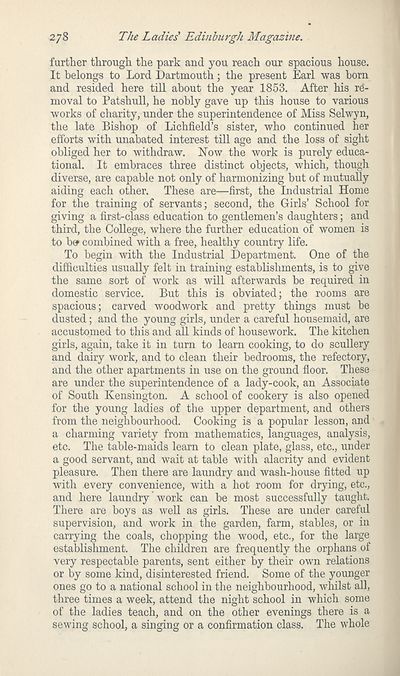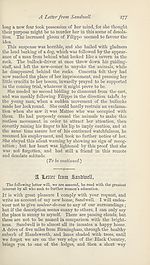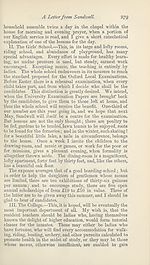Ladies’ Edinburgh Magazine > Volume 5
(286) Page 278
Download files
Complete book:
Individual page:
Thumbnail gallery: Grid view | List view

2/8 The Ladies Edinburgh Magazine.
further through the park and you reach our spacious house.
It belongs to Lord Dartmouth; the present Earl was born
and resided here till about the year 1853. After his re¬
moval to Patshull, he nobly gave up this house to various
works of charity, under the superiutendence of Miss Selwyn,
the late Bishop of Lichfield's sister, who continued her
efforts with unabated interest till age and the loss of sight
obliged her to withdraw. Now the work is purely educa¬
tional. It embraces three distinct objects, which, though
diverse, are capable not only of harmonizing but of mutually
aiding each other. These are—first, the Industrial Home
for the training of servants; second, the Girls' School for
giving a first-class education to gentlemen's daughters; and
third, the College, where the further education of women is
to b» combined with a free, healthy country life.
To begin with the Industrial Department. One of the
difficulties usually felt in training establishments, is to give
the same sort of work as will afterwards be required in
domestic service. But this is obviated; the rooms are
spacious; carved woodwork and pretty things must be
dusted; and the young girls, under a careful housemaid, are
accustomed to this and all kinds of housework. The kitchen
girls, again, take it in turn to learn cooking, to do scullery
and dairy work, and to clean their bedrooms, the refectory,
and tlie other apartments in use on the ground floor. These
are under the superintendence of a lady-cook, an Associate
of South Kensington. A school of cookery is also opened
for the young ladies of the upper department, and others
from the neighbourhood. Cooking is a popular lesson, and
a charming variety from mathematics, languages, analysis,
etc. The table-maids learn to clean plate, glass, etc., under
a good servant, and wait at table with alacrity and evident
pleasure. Then there are laundry and wash-hoiise fitted up
with every convenience, with a hot room for drying, etc.,
and here laundry work can be most successfully taught.
There are boys as well as girls. These are under careful
supervision, and work in the garden, farm, stables, or in
carrying the coals, chopping the wood, etc., for the large
establishment. The children are frequently the orphans of
very respectable parents, sent either by their own relations
or by some kind, disinterested friend. Some of the yoimger
ones go to a national school in the neighbourhood, whilst all,
three times a week, attend the night school in which some
of the ladies teach, and on the other evenings there is a
sewing school, a singing or a confirmation class. The whole
further through the park and you reach our spacious house.
It belongs to Lord Dartmouth; the present Earl was born
and resided here till about the year 1853. After his re¬
moval to Patshull, he nobly gave up this house to various
works of charity, under the superiutendence of Miss Selwyn,
the late Bishop of Lichfield's sister, who continued her
efforts with unabated interest till age and the loss of sight
obliged her to withdraw. Now the work is purely educa¬
tional. It embraces three distinct objects, which, though
diverse, are capable not only of harmonizing but of mutually
aiding each other. These are—first, the Industrial Home
for the training of servants; second, the Girls' School for
giving a first-class education to gentlemen's daughters; and
third, the College, where the further education of women is
to b» combined with a free, healthy country life.
To begin with the Industrial Department. One of the
difficulties usually felt in training establishments, is to give
the same sort of work as will afterwards be required in
domestic service. But this is obviated; the rooms are
spacious; carved woodwork and pretty things must be
dusted; and the young girls, under a careful housemaid, are
accustomed to this and all kinds of housework. The kitchen
girls, again, take it in turn to learn cooking, to do scullery
and dairy work, and to clean their bedrooms, the refectory,
and tlie other apartments in use on the ground floor. These
are under the superintendence of a lady-cook, an Associate
of South Kensington. A school of cookery is also opened
for the young ladies of the upper department, and others
from the neighbourhood. Cooking is a popular lesson, and
a charming variety from mathematics, languages, analysis,
etc. The table-maids learn to clean plate, glass, etc., under
a good servant, and wait at table with alacrity and evident
pleasure. Then there are laundry and wash-hoiise fitted up
with every convenience, with a hot room for drying, etc.,
and here laundry work can be most successfully taught.
There are boys as well as girls. These are under careful
supervision, and work in the garden, farm, stables, or in
carrying the coals, chopping the wood, etc., for the large
establishment. The children are frequently the orphans of
very respectable parents, sent either by their own relations
or by some kind, disinterested friend. Some of the yoimger
ones go to a national school in the neighbourhood, whilst all,
three times a week, attend the night school in which some
of the ladies teach, and on the other evenings there is a
sewing school, a singing or a confirmation class. The whole
Set display mode to: Large image | Transcription
Images and transcriptions on this page, including medium image downloads, may be used under the Creative Commons Attribution 4.0 International Licence unless otherwise stated. ![]()
| Ladies' Edinburgh Debating Society publications > Ladies’ Edinburgh Magazine > Volume 5 > (286) Page 278 |
|---|
| Permanent URL | https://digital.nls.uk/104361220 |
|---|
| Attribution and copyright: |
|
|---|
| Description | A 'new series' of 'The Attempt'. Published monthly. |
|---|---|
| Shelfmark | U.393 |
| Additional NLS resources: | |

